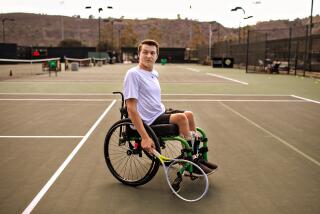Lost & Found
- Share via
Roz Kaschik’s house in Houston is filled with hundreds of swimming trophies and awards her son, Nick, won as a child. Nick was swimming competitively before he was 10 and on his way to national recognition at 13.
But Nick, now 20, doesn’t remember any of that swimming, any of those awards. There isn’t much he remembers about his life before the age of 8. And the memories between 8 and 13 are vague and sporadic.
When he was 13, Kaschik was stricken with an extremely rare infection of the lining of the brain, called viral meninges encephalitis. After falling into a coma for more than a month, he awoke, his family strangers and his past a mystery to him.
He didn’t know that the woman in the hospital room who seemed so elated when he emerged from the coma was his mother. Gone were memories of how he first got involved in swimming, of his first victory, even of the close relationship he had developed during weeklong summer swim camps with the man who would one day become his coach at USC.
Since the coma, Kaschik has relied on stories, pictures and some flashbacks to figure out who he was for the first 13 years of his life.
“Ever since I got ill, it’s like you pick up with the life you’ve been given since you were sick, and you learn about somebody else that’s supposedly you,” said Kaschik, a freshman at USC who will compete in four events at the Pacific 10 Conference championships beginning today at Belmont Plaza Pool in Long Beach.
That Kaschik is alive is almost a miracle, and that he is swimming competitively is making medical history.
It wasn’t until after Kaschik awoke from his coma that doctors diagnosed his condition. Kaschik and his family were told there had been 30 known cases of the infection and that only seven individuals survived, all suffering some sort of paralysis.
Kaschik first felt signs of being ill one Friday in January 1992 while swimming at a meet in Houston. He left the blocks awkwardly and felt a pulling pain in his abdomen and groin.
The pain continued through the weekend, and he began showing flu-like symptoms. Two doctors told him it was flu early the next week. But after he woke up Wednesday, he struggled into the bathroom, began to lose his balance and, after he looked in the mirror, fell into convulsions and slipped into the coma.
He was rushed to the hospital.
“It’s still real hard for me to talk about,” Roz said. “The doctor said, ‘Mrs. Kaschik, we believe your son is dying.’ ”
Her son survived. When he awoke, he had very little muscle control. He could not walk and had to be tied to the bed to remain sitting up.
But within a week, he was walking on his own. Once he could do that, there was only one thing Kaschik wanted to do.
“I don’t remember swimming before my illness except for that last meet when I got sick,” Kaschik said. “But my body remembered all the strokes.
“Once I learned how to walk when I was in intensive care, I remember walking with my I.V. into the bathroom and filling up the tub. I just wanted to get wet.”
Said Roz: “One of the first things he asked me was, ‘Will I swim?’ ”
He was back in the pool competing only four weeks after he had begun walking again.
Swimming was the easy part for Kaschik, the fun part. The effects of his illness went far beyond the pool during his recovery. Certain colors and shapes, family and friends, places such as his house and neighborhood, and some things he had learned in school were foreign to him.
All he could do was believe what people were telling him and hope memories would come back.
“I woke up, and I didn’t trust anybody,” he said. “It became a thing of trust from that point on. The foundation of all my relationships has been trust, especially early on.”
Once the trust was there, Kaschik wanted to find out as much as he could about his past. He asked questions of his mom and older brother, Michael, and asked them to tell him old stories. He spent countless hours looking at pictures and watching old home movies. But stories and pictures weren’t memories. Those still come without warning, when Kaschik isn’t expecting them.
“I was visiting my girlfriend last Christmas, and was playing catch with her 10-year-old little brother,” he said. “Then I got a spark and remembered when I played Little League.”
And a simple Sunday spent watching football led him to remember playing football in the mud with his brother when they were kids. These flashbacks have given him back a small percentage of the memories he lost.
“It’s very spotty,” Kaschik said. “There’s certain things I remember, there’s weird things I remember, like my first girlfriend when I was a kid. But I don’t remember some of my best friends growing up.”
The thing Kaschik lost that proved to be most frustrating was his short-term memory. After missing about two months of school, he returned to his eighth-grade class but frequently had severe headaches, often going home after half a day and hardly participating in class.
But teachers gave him the grades he was getting before the illness, allowing him to advance to high school, where things didn’t change much.
“I just smiled and I guess they were sympathetic and gave me good grades,” Kaschik said.
When he went to a prep school in New Jersey for 10th grade while his parents went through a divorce in Houston, the impact of his memory loss in the classroom became apparent.
Kaschik had to repeat 10th grade, but working with a learning specialist allowed him to retain information more efficiently.
He was also progressing in the pool. Kaschik was named most valuable swimmer at the 1996 U.S. Open, an international meet, and competed in the 1996 Olympic trials. And it was while he was at that prep school in New Jersey that Kaschik made another discovery about his past that changed his future.
When he was a child in Houston, Kaschik had taken part in summer swimming camps at the University of Texas. One of the men who held the camps was Mark Schubert, who coached the Texas women from 1989 to 1992 before taking over men’s and women’s programs at USC.
“Nick caught my attention because of his talent and his enthusiasm,” Schubert said. “So I followed him. I saw him at the U.S. Open.
“I thought I had an inside track on recruiting him because we were close at those camps.”
But when Schubert, recently named one of two head coaches of the 2000 U.S. Olympic swimming team, went to Florida to visit Kaschik after his junior year at his mom’s new home, he got a big surprise.
“He started telling the story [of the Texas camps], and I looked at my mom like, ‘Fill me in here,’ ” Kaschik said.
Schubert knew of Kaschik’s illness but assumed Kaschik would remember something about him and the camps. Schubert had to reintroduce himself and start from scratch, but that didn’t discourage him from recruiting his former camper.
“When we were at those camps, I felt like we had a special connection,” Schubert said. “And even after I realized he didn’t remember me in Florida, I still felt that connection.”
His feeling was right. USC was an easy decision for Kaschik.
“It’s a great school, I like L.A., the team’s great, the facilities are great and I have who I consider the best coach in the world,” Kaschik said.
And that’s all that’s important now to Kaschik, who will compete in the 200- and 400-yard individual medley, 200 breaststroke and 200 backstroke for the No. 4 Trojans in the Pac-10 meet. Kaschik, who has the Trojans’ best time in the 200 individual medley this year, wants to live in the present.
“I don’t worry about what I don’t remember,” he said. “If I want to know something, I ask my mom or brother. I’m happy where I’m at.”
(BEGIN TEXT OF INFOBOX / INFOGRAPHIC)
Swimming Championships
* What: Men’s Pac-10 championships
* When: Today through Saturday, preliminaries 11 a.m., finals 6 p.m.
* Where: Belmont Plaza Pool, 4000 East Olympic Plaza, Long Beach
* Tickets: Preliminaries are free, finals are $8 for adults, $4 for students, people under 16 and senior citizens. All sessions passes are $20 for adults, $10 for students, people under 16 and senior citizens.
* Information: (562) 570-1806
More to Read
Fight on! Are you a true Trojans fan?
Get our Times of Troy newsletter for USC insights, news and much more.
You may occasionally receive promotional content from the Los Angeles Times.






